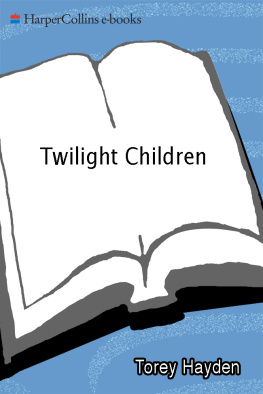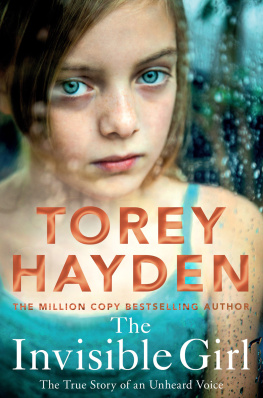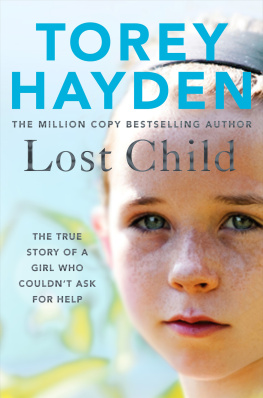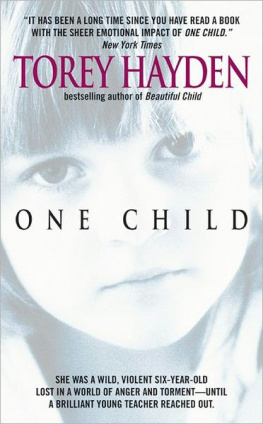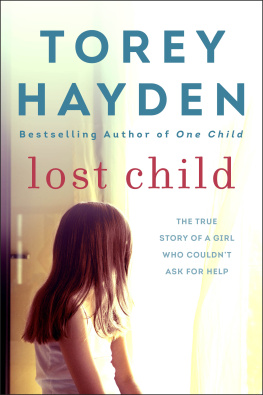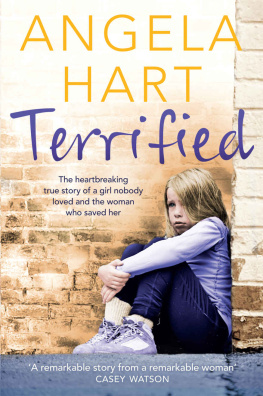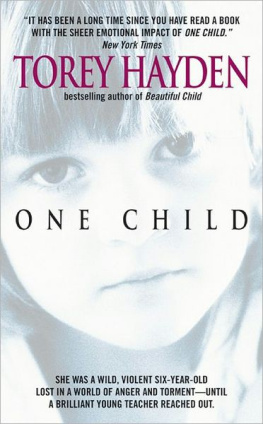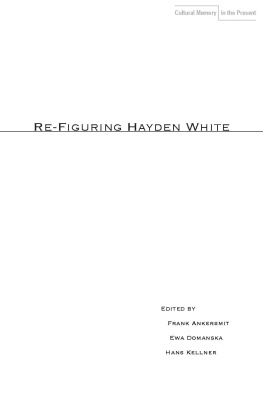
Contents
Torey Hayden deserves the kind of respect I cant give many people. She isnt just valuable, shes incredible.
Boston Globe
[Hayden] persuades us that even the most withdrawn and troubled child can be reached if someone takes the time, pays attention, and sincerely, deeply cares.
O magazine
Shes awfully, awfully good She never fails to convey all the tearful and chilling moments this involvement of hers brings.
Chicago Tribune
This remarkable teacher reminds us that love takes many forms.
New York Times
[Her] characters will haunt you.
Indianapolis News
A fine storyteller Hayden has a gift.
Washington Post Book World
Books by Torey Hayden
T WILIGHT C HILDREN
B EAUTIFUL C HILD
O NE C HILD
G HOST G IRL
J UST A NOTHER K ID
M URPHYS B OY
S OMEBODY E LSES K IDS
T HE T IGERS C HILD
T HE S UNFLOWER F OREST
AVON BOOKS
An Imprint of HarperCollinsPublishers
10East 53rd Street
New York, New York 10022-5299
Copyright 2005 by Torey Hayden
ISBN-13:978-0-06-056089-8
ISBN-10: 0-06-056089-4
www.avonbooks.com
EPub Edition JANUARY 2013 ISBN: 9780062271181
All rights reserved under International and Pan-American CopyrightConventions. By payment of the required fees, you have been granted the nonexclusive,nontransferable right to access and read the text of this e-book on-screen. No part of this text maybe reproduced, transmitted, downloaded, decompiled, reverse-engineered, or stored in or introducedinto any information storage and retrieval system, in any form or by any means, whether electronicor mechanical, now known or hereinafter invented, without the express written permission ofHarperCollins e-books.
First Avon Books paperback printing: March 2006
First William Morrowhardcover printing: March 2005
Avon Trademark Reg. U.S. Pat. Off. and in Other Countries, Marca Registrada,Hecho en U.S.A.
HarperCollins is a trademark of HarperCollins PublishersInc.
Printed in the U.S.A.
10 9 8 7 6 5 4 3 2 1
S he was a small, fine-boned girl with a pointed pixie chin and unusually distinct cheekbones. Her hair was a soft black, straight and shoulder length, but it had been rather raffishly cut, as if perhaps done by another child. Her eyes, however, defined her face. Enormous, protruding slightly, and fluidly dark, like shadowed water, they overpowered her other features. She wasnt what I would call a pretty girl, but she was striking in a faintly unreal way, so that when she lifted her hand to push hair back from her face, I half expected to see elfin ears.
Hello, I said and pulled out the chair at the table.
She hunched forward, hands down between her knees so that her chin was almost on the tabletop. Her eyes, however, remained on me. She smiled in a manner that was rather self-conscious, yet friendly enough.
Whats your name? I asked.
Cassandra.
Ah, a mythical name. It fit the fairy-tale looks.
How old you are, Cassandra?
Nine.
My names Torey, and you and I are going to be working together each day. I pulled out a chair adjacent to hers and sat down. Can you tell me why youve come to the unit?
Her dark eyes locked on mine, and for a moment or two she stared intently, as if she expected to find the answer there. Then she shook her head faintly. No.
What about your mom? What did she tell you about why you were coming here?
I dont remember.
Okay, I said. I bent down and opened my box of materials. Taking out plain paper and a smaller cardboard box, I laid them on the table. Most of the children I work with come to the unit because they have problems that make them feel bad. Sometimes, for example, they have problems in their family. Maybe someone in the family is really unhappy and it makes them do hurtful things. Maybe theres been a divorce. Maybe theres lots of fighting at home. For some of the children who come here, its other things. Maybe theyve been in an accident or a really scary situation, or theyve been very ill. Some have been treated or touched in a way that felt wrong, or people tried to make them keep secrets that hurt. And sometimes sometimes kids dont even know the reason they have troubles. They just feel angry or worried or scared all the time. So these are some of the reasons children come to the unit.
Cassandra watched me with unusual intensity, as if she were really trying to take in what I was saying, trying to absorb it, almost. Nonetheless, there was an oddly blank quality to her stare, almost as if she were listening so carefully not for the content of what I was saying but rather because I was speaking to her in a foreign language she didnt quite understand.
Hearing about reasons for other children coming to the unit, I said, do you think any of those describe you?
I dont know.
Okay. Well, Ill share with you some of the things other people have told me about you. You can then say if you think they are true or not.
Your mom, for instance, tells me that you had a scary thing happen to you when you were five. She says that she is divorced from your dad and that you and your sister were supposed to live with her and not see him. Then one day your dad came to school and had you get into his car, even though that was against the rules. He drove off with you and wouldnt bring you back, and he wouldnt phone your mom to tell her that you were safe, and he wouldnt let you phone your mom. She says you were gone a long timeabout two yearsand during the time you were with your dad, some very scary things happened to you. Is that right?
Cassandra nodded. Her demeanor was pleasant, cheerful even, as if Id said no more than Your mom says you are in third grade.
Your teacher tells me that you like school, that you can be very enthusiastic about what is happening in class. She says you are quite a smart girl and can do really well sometimes.
Cassandra smiled.
But she also tells me that at other times you have lots of problems. You can get very angry and have a hard time following the rules. Occasionally when you are at school, you get very upset and then you stop talking. Mrs. Baker says there are sometimes days and days when you dont want to say anything to anyone, and this makes it difficult to do your work in class. But she tells me while these are bad problems, they arent the biggest problem. She says the biggest problem is that you very often dont tell the truth. You make up stories about people that get them into trouble, and you often talk about things that arent really happening at all.
I paused. What do you think? Do you think these things have caused trouble for you?
Cassandra shrugged. It came off as almost a comical gesture, the way she did it. She brought her shoulders way up and rolled her eyes in an exaggerated fashion that was tinged with tolerant good humor, as if to say, Silly grown-ups, who make mountains out of molehills.
These are the reasons the grown-ups have given me, when I asked, Why is Cassandra Ventura on the unit?
Cassandra rolled her eyes again, then looked up to the right, then up to the left, then back to the right.
What do you think? I asked. Do these things seem like problems to you?
I dont know.
Im interested in your thoughts. There isnt a wrong or right answer to my questions. Were just exploring.
I dont know, she repeated.
You dont know?
I dont remember.
You dont remember what? If you do those things? If people think those are problems? Or you dont remember what I just said?
Next page
